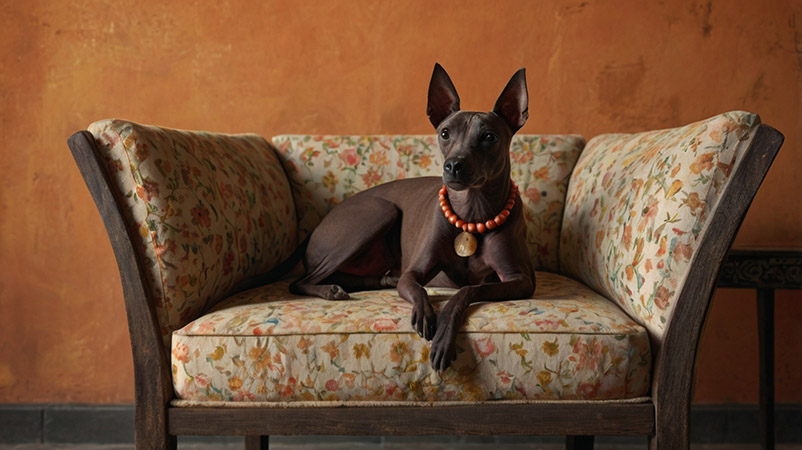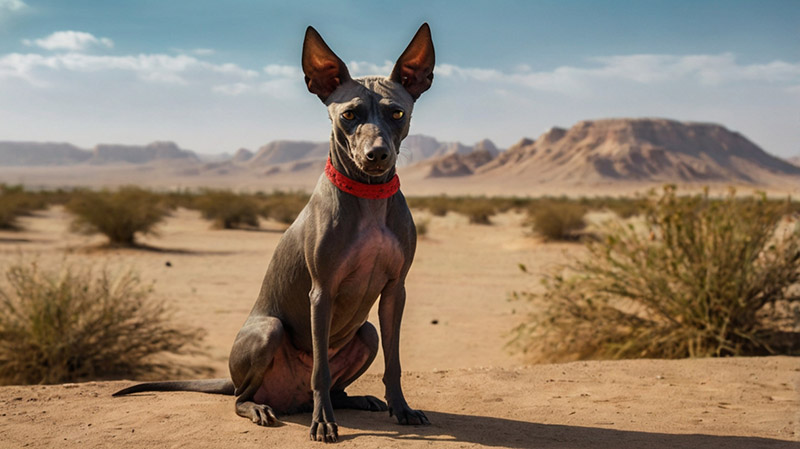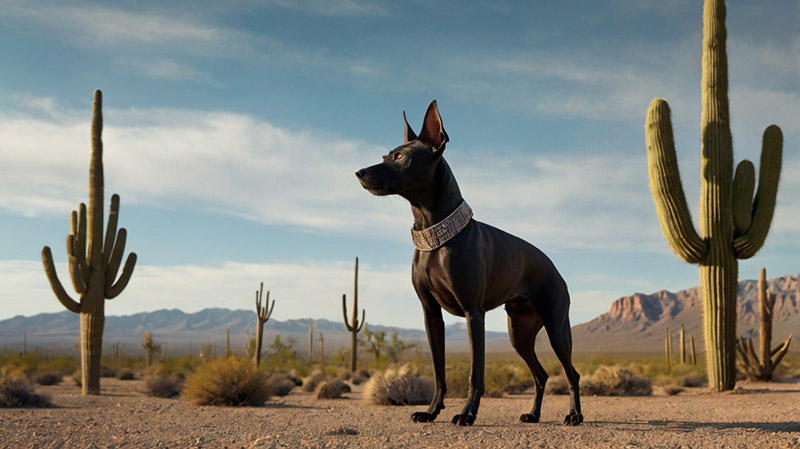The morning light filtered through my kitchen window as I watched my neighbor’s Xoloitzcuintli, Citlali, padding silently across the yard. There was something almost otherworldly about her movement- graceful, deliberate, ancient. As she paused to survey her domain, I found myself wondering about the weight of names, particularly for a breed that carries three thousand years of sacred history in its very DNA.
Choosing a name for a Xoloitzcuintli isn’t like naming a Golden Retriever or a Labrador. This isn’t just about finding something that sounds cute or rolls off the tongue easily. When you look into those dark, knowing eyes of a Xolo, you’re looking at a living bridge to the Aztec and Maya civilizations, a creature once believed to guide souls through the underworld. The name you choose becomes part of that sacred continuum.
I’ve spent years observing dogs and their people, and I’ve learned that the right name doesn’t just identify – it transforms. It creates an invisible thread between human and canine hearts, a daily affirmation of the bond you’re building. For the Xoloitzcuintli, Mexico’s national treasure and the world’s oldest and most ancient dog breed, this choice carries even greater significance.

When Simple Becomes Sacred
Universal Names for Both Males and Females
There’s wisdom in simplicity, something the ancient peoples who first cherished these dogs understood well. The best universal names for Xoloitzcuintli possess a musical quality that honors their heritage while remaining accessible to modern families.
I remember watching a young Xolo respond to the name “Luna” for the first time. The owner had chosen it not just for its meaning – moon, but for how it seemed to capture the ethereal quality of her hairless, silver-gray companion. The dog’s ears perked forward, head tilting slightly, as if recognizing something ancestral in those two syllables.
Perfect Universal Choices:
- Yuma – meaning “son of the chief”
- Coco – playful yet dignified
- Paco – diminutive of Francisco, meaning “free one”
- Nera – meaning “black” in Italian, perfect for dark-coated Xolos
- Luna – moon, reflecting their mystical nature
- Kava – strong and memorable
- Roco – rock-solid and dependable
- Zana – meaning “lily” in several languages
- Tula – meaning “leaping water”
- Solo – acknowledging their independent spirit
- Moki – Native American for “deer”
- Runa – meaning “secret” or “mystery”
- Niko – victory of the people
- Zara – meaning “blooming flower”
- Tino – diminutive of names ending in -tino
- Mila – meaning “gracious” or “dear”
- Rio – meaning “river”
- Kira – meaning “killer” in Japanese, “light” in Persian
- Zola – meaning “earth” in Latin
- Naya – meaning “new” in various languages
The Feminine Divine
Names for Female Xoloitzcuintli
Female Xolos possess a particular kind of intelligence – watchful, intuitive, protective without being aggressive. I’ve noticed they often seem to read their families’ emotions with uncanny accuracy, positioning themselves as silent guardians of the household’s emotional well-being.
The names that suit them best carry this same quality of gentle strength. They should sound melodious when called across a park, yet carry enough gravitas to match the breed’s dignified bearing.
Beautiful Choices for Females:
- Ayani – meaning “my strength”
- Nita – meaning “bear” in Choctaw
- Malina – meaning “raspberry” in various Slavic languages
- Sol – meaning “sun” in Spanish
- Xima – short and distinctive
- Tika – meaning “flower” in Quechua
- Cora – meaning “maiden”
- Naya – meaning “new”
- Zari – meaning “golden” in Persian
- Alma – meaning “soul” in Spanish
- Chia – meaning “strength” in various contexts
- Dara – meaning “pearl of wisdom”
- Ema – meaning “whole” or “universal”
- Fina – meaning “fine” or “delicate”
- Gala – meaning “festive”
- Hana – meaning “flower” in Japanese
- Ila – meaning “earth” in Sanskrit
- Jara – meaning “spring” in Slavic
- Kala – meaning “art” in Sanskrit
- Lara – meaning “protection”
The Masculine Mystique
Names for Male Xoloitzcuintli
Male Xolos often carry themselves with a quiet confidence that speaks to their ancient role as protectors and companions. They’re not typically aggressive, but there’s an unmistakable presence about them – a sense that they’re always aware, always ready.
The best names for males capture this balance of strength and serenity. They should be easy to call out during training sessions, yet substantial enough to match the breed’s impressive bearing.
Strong Choices for Males:
- Tlaloc – Aztec god of rain and fertility
- Zuma – meaning “peace”
- Chaco – meaning “hunting dog”
- Teo – meaning “gift of God”
- Lobo – meaning “wolf” in Spanish
- Cuate – meaning “buddy” in Mexican Spanish
- Xoco – shortened from Xoloitzcuintli
- Izel – meaning “unique”
- Nahual – referring to a shapeshifter in Mesoamerican folklore
- Beto – diminutive of Roberto
- Ciro – meaning “sun” in Persian
- Dano – meaning “God is my judge”
- Enzo – meaning “ruler of the household”
- Flaco – meaning “thin” (playful reference to their lean build)
- Gato – meaning “cat” (for their feline-like grace)
- Hugo – meaning “mind” or “spirit”
- Ivo – meaning “yew tree”
- Juno – Roman god name
- Keno – meaning “bright”
- Lalo – diminutive of Eduardo
Voices from the Ancient South
Indigenous Names from South America
The spiritual connection between Xoloitzcuintli and indigenous cultures extends beyond Mexico. Throughout South America, indigenous peoples have long understood the sacred bond between humans and dogs. Their languages offer names that capture the essence of natural forces and spiritual concepts.
These names carry the weight of mountains, the flow of rivers, and the wisdom of peoples who lived in harmony with the natural world for millennia.
South American Indigenous Treasures:
- Amaru – meaning “serpent” in Quechua, symbolizing wisdom
- Inti – meaning “sun” in Quechua
- Kusi – meaning “joy” in Quechua
- Tupi – from the Tupi people of Brazil
- Yara – meaning “water lady” in Tupi
- Suma – meaning “beautiful” in Quechua
- Chaska – meaning “star” in Quechua
- Uru – meaning “day” in various Andean languages
- Wayra – meaning “wind” in Quechua
- Chuya – meaning “clear” in Quechua
- Illapa – meaning “lightning” in Quechua
- Killa – meaning “moon” in Quechua
- Mama – meaning “mother” (used in compound names)
- Nina – meaning “fire” in Quechua
- Oka – meaning “place” in various indigenous languages
- Puma – the sacred mountain cat
- Qori – meaning “gold” in Quechua
- Rumi – meaning “stone” in Quechua
- Sami – meaning “fortune” in Quechua
- Tika – meaning “flower” in Quechua
The Heart of Mesoamerica
Popular Indigenous Names from Mesoamerica
Walking through the ruins of Teotihuacan or Chichen Itza, you can almost hear the echoes of these ancient names. The peoples of Mesoamerica – the Nahua, Maya, Totonac, Zapotec, and Mixe- created a rich tapestry of language that perfectly captures the mystical nature of the Xoloitzcuintli.
Mesoamerican Gems:
- Citlali – meaning “star” in Nahuatl
- Xochitl – meaning “flower” in Nahuatl
- Itzel – meaning “rainbow lady” in Maya
- Tonal – meaning “soul” in Nahuatl
- Izel – meaning “unique” in Nahuatl
- Tecuani – meaning “wild beast” in Nahuatl
- Nahui – meaning “four” in Nahuatl
- Teyacapan – meaning “first place” in Nahuatl
- Akbal – meaning “night” in Maya
- Balam – meaning “jaguar” in Maya
- Chaac – Maya rain god
- Dzul – meaning “gentleman” in Maya
- Eztli – meaning “blood” in Nahuatl
- Itzamna – Maya creator god
- Kukulkan – Maya feathered serpent
- Manik – meaning “hand” in Maya
- Nicte – meaning “flower” in Maya
- Ollin – meaning “movement” in Nahuatl
- Pakal – meaning “shield” in Maya
- Sacnite – meaning “white flower” in Maya

Divine Connections
Names Honoring Indigenous Gods
There’s something profoundly moving about watching a Xoloitzcuintli named after an ancient deity. It’s as if the dog carries forward not just the name, but the essence of what that god represented to their people.
I once met a magnificent black Xolo named Quetzalcoatl – Quetzi for short. His owner, a thoughtful woman from Oaxaca, explained that she chose the name not for its grandeur, but because Quetzalcoatl represented the bridge between earth and sky, much like her dog bridged the ancient and modern worlds in her life.
Divine Names:
- Quetzalcoatl – feathered serpent god
- Tezcatlipoca – smoking mirror god
- Huitzilopochtli – god of war and sun
- Ixchel – Maya goddess of medicine and moon
- Tlaloc – god of rain and fertility
- Chalchiuhtlicue – goddess of rivers and lakes
- Xipe – god of agriculture and renewal
- Coatlicue – earth goddess
- Mictlantecuhtli – lord of the underworld
- Tonatiuh – sun god
- Coyolxauhqui – moon goddess
- Ehecatl – wind god
- Mayahuel – goddess of agave
- Patecatl – god of healing
- Xochiquetzal – goddess of love and beauty
- Chicomecoatl – goddess of agriculture
- Tlazolteotl – goddess of purification
- Xiuhtecuhtli – god of fire
- Cipactli – earth monster
- Ometeotl – dual god of creation
Spanish Elegance
Spanish Names for Xoloitzcuintli
The Spanish colonial period in Mexico created a beautiful fusion of cultures, and this is reflected in the names that work wonderfully for Xoloitzcuintli. These names carry the warmth and musicality of the Spanish language while remaining accessible to English speakers.
Classic Spanish Choices:
- Diego – meaning “supplanter”
- Sofia – meaning “wisdom”
- Mateo – meaning “gift of God”
- Lucia – meaning “light”
- Lola – diminutive of Dolores
- Juan – meaning “God is gracious”
- Carmen – meaning “garden”
- Esteban – meaning “crown”
- Ana – meaning “grace”
- Marisol – meaning “sea and sun”
- Pablo – meaning “small”
- Elena – meaning “bright light”
- Carlos – meaning “free man”
- Rosa – meaning “rose”
- Miguel – meaning “who is like God”
- Isabel – meaning “pledged to God”
- Rafael – meaning “God heals”
- Esperanza – meaning “hope”
- Fernando – meaning “brave traveler”
- Valentina – meaning “strong”
- Alejandro – meaning “defender of men”
- Gabriela – meaning “God is my strength”
- Ricardo – meaning “brave ruler”
- Paloma – meaning “dove”
- Sergio – meaning “servant”
Cultural Tapestry
Names Inspired by Mexican Culture
Mexico’s rich cultural heritage offers a treasure trove of naming possibilities that celebrate everything from art and literature to food and traditions. These names capture the vibrancy and passion of Mexican culture.
Cultural Gems:
- Frida – honoring Frida Kahlo
- Coyo – short for coyote
- Mezcal – the traditional spirit
- Lucha – meaning “fight” (as in Lucha Libre)
- Churro – the beloved pastry
- Cacao – the sacred bean
- Azul – meaning “blue”
- Cempasúchil – the marigold flower
- Mariachi – the musical tradition
- Flor – meaning “flower”
- Cumbia – the dance and music style
- Tequila – the national spirit
- Salsa – the dance and sauce
- Piñata – the festive tradition
- Fiesta – meaning “party”
- Dulce – meaning “sweet”
- Fuego – meaning “fire”
- Tierra – meaning “earth”
- Cielo – meaning “sky”
- Corazón – meaning “heart”
Color and Form
Names Based on Appearance
The Xoloitzcuintli’s unique appearance – whether hairless or coated, black, gray, bronze, or slate – offers wonderful inspiration for names. Their elegant, lean build and alert expression deserve names that celebrate their distinctive beauty.
| Color/Feature | Name Options | Meaning |
|---|---|---|
| Black coat | Shadow, Onyx, Midnight | Dark elegance |
| Gray coat | Smoke, Sterling, Ash | Sophisticated neutrals |
| Bronze coat | Copper, Rusty, Amber | Warm metallics |
| Hairless | Silk, Velvet, Smooth | Tactile qualities |
| Spotted | Patches, Freckles, Dot | Pattern references |
Appearance-Based Names:
- Shadow – for dark, mysterious Xolos
- Onyx – for jet-black coats
- Cinder – for gray and black combinations
- Smoke – for gray Xolos
- Ebony – for deep black coats
- Gris – meaning “gray” in Spanish
- Ashi – meaning “gray” in Japanese
- Sombra – meaning “shadow” in Spanish
- Plata – meaning “silver” in Spanish
- Carbon – for very dark Xolos
- Slate – for blue-gray coloring
- Copper – for bronze-colored dogs
- Rusty – for reddish-brown coats
- Amber – for golden-brown coloring
- Velvet – for their smooth skin texture
- Silk – for their soft, hairless skin
- Smooth – celebrating their unique coat
- Sleek – for their elegant build
- Lean – for their athletic physique
- Grace – for their elegant movement
Modern Urban Style
Contemporary Names for City Xolos
Today’s Xoloitzcuintli often live in urban environments, accompanying their families through modern life while maintaining their ancient dignity. These contemporary names honor that duality – trendy enough for the dog park, meaningful enough for a breed with such profound heritage.
Modern Choices:
- Neo – meaning “new”
- Rio – meaning “river”
- Zola – meaning “earth”
- Niko – meaning “victory”
- Jazz – for musical families
- Mika – meaning “beautiful fragrance”
- Vibe – for dogs with great energy
- Tino – diminutive ending
- Lux – meaning “light”
- Pina – meaning “pineapple”
- Kai – meaning “ocean” in Hawaiian
- Zoe – meaning “life”
- Max – meaning “greatest”
- Mia – meaning “mine”
- Leo – meaning “lion”
- Ava – meaning “bird”
- Eli – meaning “ascended”
- Ivy – the climbing plant
- Rex – meaning “king”
- Gem – precious stone

Playful Affection
Fun Mexican Nicknames
Every Xoloitzcuintli deserves a collection of affectionate nicknames that capture their playful side. These diminutives and pet names reflect the warmth and humor of Mexican culture.
Affectionate Nicknames:
- Chiqui – meaning “little one”
- Taki – playful and fun
- Papi – meaning “daddy” (affectionate)
- Nena – meaning “baby girl”
- Galleta – meaning “cookie”
- Bimbo – playful nickname
- Pelusa – meaning “fluff”
- Gordito/Gordita – meaning “little chubby one”
- Bebé – meaning “baby”
- Corazoncito – meaning “little heart”
- Chulo/Chula – meaning “cute”
- Tesoro – meaning “treasure”
- Angelito – meaning “little angel”
- Precioso/Preciosa – meaning “precious”
- Cariño – meaning “affection”
- Dulzura – meaning “sweetness”
- Mimoso/Mimosa – meaning “cuddly”
- Travieso/Traviesa – meaning “mischievous”
- Juguetón – meaning “playful”
- Consentido/Consentida – meaning “spoiled”
The Art of Choosing
Practical Guidance for Name Selection
After years of watching dogs respond to their names, I’ve learned that the perfect name often reveals itself through observation and patience. The right name for your Xoloitzcuintli should feel natural when you say it, capture something essential about your dog’s personality, and honor the breed’s magnificent heritage.
Key Considerations:
Sound and Clarity – Choose names with clear consonants and vowels. Xolos are intelligent and respond well to names that are easy to distinguish from common commands. Avoid names that sound like “sit,” “stay,” or “come.”
Length and Rhythm – Two-syllable names often work best for training and daily use. They’re long enough to be distinctive but short enough for quick recall during play or training sessions.
Cultural Respect – If you choose a name from indigenous languages or mythology, take time to understand its meaning and significance. These names carry cultural weight and deserve to be used with respect and understanding.
Personal Connection – The best names often reflect something meaningful about your relationship with your dog or your family’s heritage. Don’t feel pressured to choose something exotic if a simpler name feels right.
Growth Potential – Consider how the name will sound when your puppy becomes an adult. “Tiny” might be cute for a Xolo puppy, but it may not suit a dignified adult dog.
Frequently Asked Questions About the Name for Xoloitzcuintli
The Sacred Bond
Standing in my garden this evening, watching Citlali next door settle into her favorite spot for the night, I’m reminded of why names matter so much for these ancient dogs. Each Xoloitzcuintli carries within them the genetic memory of thousands of years of companionship with humans. They’ve been healers, guides, protectors, and beloved family members across countless generations.
When you choose a name for your Xoloitzcuintli, you’re not just selecting a convenient label – you’re participating in an ancient tradition of recognition and respect. You’re acknowledging that this dog is more than a pet; they’re a living link to one of humanity’s oldest and most sacred relationships with the canine world.
The name you choose will be spoken thousands of times over your dog’s lifetime. It will be the first word they learn to recognize, the sound that brings them running from across the park, the gentle whisper that comforts them in their final years. Choose it with the same care and reverence that the ancient peoples of Mexico showed when they first welcomed these remarkable dogs into their hearts and homes.
Whether you select Tlaloc or Diego, Citlali or Luna, Quetzalcoatl or simply Max, let the name be a bridge – between past and present, between cultures, between the human and canine hearts that beat in rhythm with each other. In the end, the perfect name is the one that honors both your dog’s magnificent heritage and the unique individual they are destined to become in your life.
The Xoloitzcuintli has waited three thousand years to find their way to your family. They deserve a name that celebrates both the journey they’ve taken and the love they’re about to give.








